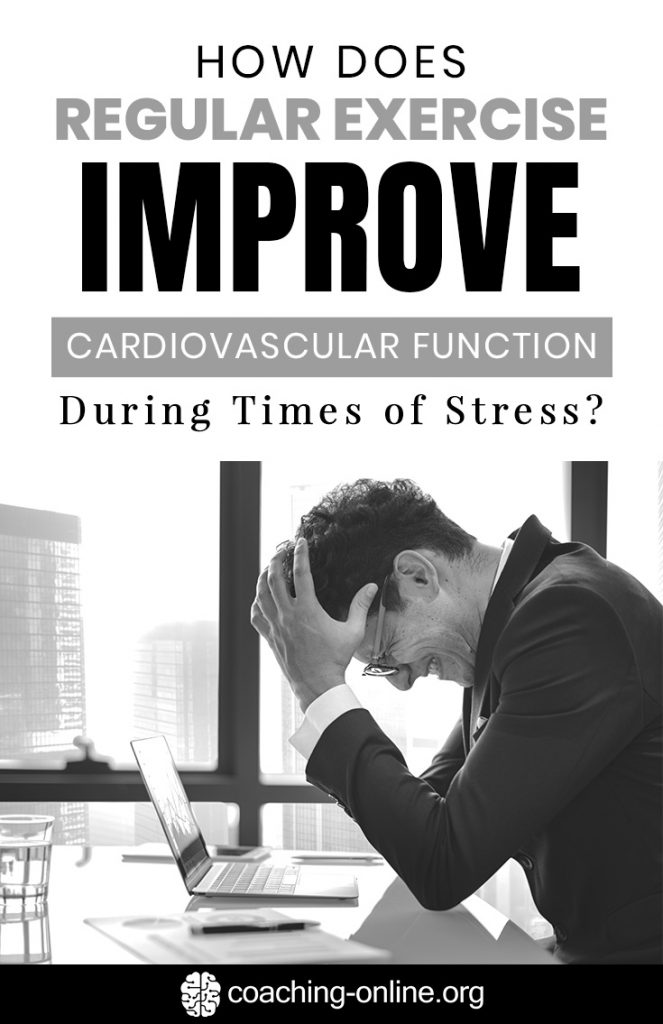Regular exercise may not appear to be an immediately obvious answer to improve cardiovascular function or mental health problems.
Below, you’ll learn why it is an answer you can rely on.
Perhaps you’ve been prescribed regular exercise as an answer to your heart problems or to reduce your daily stress, and you’ve now been led to question how does regular exercise improve cardiovascular function during times of stress?
As an individual who has been studying mental health – and stress in particular – for many years, I am confident in my ability to answer this question for you.
The answer will be backed up by medical research when possible.

How Does Regular Exercise Improve Cardiovascular Function?
Before we begin to answer this question, it’s important to remember that your heart is a muscle.
Of course, it functions differently to other muscles, but it also has many similarities.
Perhaps most importantly for the answer to this question, it’s important to know that the heart gets stronger the harder it’s worked.
It’s no different to your biceps, triceps etc in this way.
The stronger your heart becomes, the less hard it has to work to perform everyday functions.
The less hard it has to work, the longer it will remain in fantastic working condition.
Aerobic exercises such as jogging, swimming, cycling or crossfit are best for improving the strength of your heart, hence why these exercises are labelled “cardio”.
Upping the intensity of these activities – and therefore transitioning into anaerobic exercise – is less helpful for the heart.
In fact, if you regularly overdo it, it could be harmful.
With that explained, let’s dive into the answer of how cardiovascular function improves after exercise.
1. Exercise Increases Energy Levels And Lowers Blood Pressure
Your stronger heart, gained from regular exercise, can pump more blood with less effort.
This decreases the force on your arteries, lowering your blood pressure to a healthier level.
Regular exercise has been proven to be just as effective as cardiovascular medication at doing this.
It’s a healthier alternative, for sure.
As you become fitter and healthier through regular exercise, it will take a greater level of physical activity to increase your heart rate and speed of breathing beyond resting levels.
This is good.
The fact you’re not thrown into a state of exhaustion every time you climb the stairs will do wonders for your long-term cardiovascular health.
2. Exercise Increases Oxygen Supplies And Lowers Triglyceride Levels
Your body converts calories it doesn’t need into triglycerides – a type of fat stored in your blood.
People with high triglyceride levels are proven to have an increased risk of heart problems.
If your blood isn’t well oxygenated, you carry the same risks.
Thankfully, regular exercise increases oxygen supplies and lowers triglyceride levels.
The increased oxygen supplies come from an increased lung capacity, allowing your respiratory system to oxygenate the blood more efficiently.
The answer to the question of why exercise lowers triglyceride levels is perhaps more obvious. After all, it’s fat.
When we exercise, we use more of the calories we consume and burn additional fats to produce energy.
Any activity which increases oxygen supplies and lowers triglyceride levels will be great for overall heart health – and aerobic exercise is definitely one of them.

3. Exercise Increases The Level Of Feel-Good Hormones Circulating In The Body, Reducing Stress And Therefore Strain On The Heart
You may have heard of a sensation called the “runner’s high”.
This is not a myth.
When we exercise, our brain releases endorphins that act as analgesics and sedatives, reducing the perception of pain and even producing a feeling of mild euphoria.
More recent studies show that endocannabinoids are also activated, helping to calm us.
This is one of several ways that our brain works to make us more comfortable in our bodies.
Similar chemicals are released when we suffer a serious injury.
If you’re looking for answers as far as how the brain knows when to release certain chemicals, you’re not the only one. At present, there are still more questions than definitive answers on this topic.
How Stress Hormones Harm Your Cardiovascular System
The release of these chemicals make us feel great, and reduce the production of stress hormones in our body.
This is important because stress hormones – such as cortisol or adrenaline – put a greater strain on the heart, increasing blood pressure.
Perhaps you’ve noticed how muscles feel more tense, heavy and overworked during times of stress.
Well, your heart is a muscle which can suffer from this same problem.
You may have heard some people exaggerate that they “almost had a heart attack” when they are startled or receive shocking news.
Well, this expression is partly based on fact, because a sudden huge rush of stress hormones is actually enough to cause serious heart complications like this.
Thankfully, we can reduce stress in a safe and healthy way via aerobic exercise.

4. Exercise Improves Sleep Quality
When you regularly exercise, you’ll find it easier to fall into a deep sleep for longer.
This is partly because of the rise and subsequent fall in body temperature leading to drowsiness at night.
The stress-removing elements of exercise also play a role.
Scientists are still looking for further answers as to why else sleep quality is so much better if you exercise regularly.
This is important because poor sleep is linked to poor heart health in a number of ways.
For starters, it produces an excess in the stress hormone cortisol, placing extra strain on the heart.
What’s more, it leads to higher blood pressure.
Your blood pressure naturally falls when you’re asleep, so sleep problems mean it’ll be higher for longer.
Finally, there have been several studies pointing out a link between poor sleep and an increased risk of health problems such as diabetes and cardiovascular inflammation.
Definitive answers regarding why this is the case still need to be found.
Want To Dive Deeper?
Regular exercise is the answer to many physical health problems, not just those involving the cardiovascular system.
Still, hopefully, this answers the question of how does regular exercise improve cardiovascular function during times of stress.
If you’ve got a question about how exercise or stress affects the body, feel free to ask in the comments.
I’ll answer as many as I can.
Related Posts
Best Healthy Breakfast Smoothie
How Can Doing Something for Someone Else Help to Relieve Stress?
